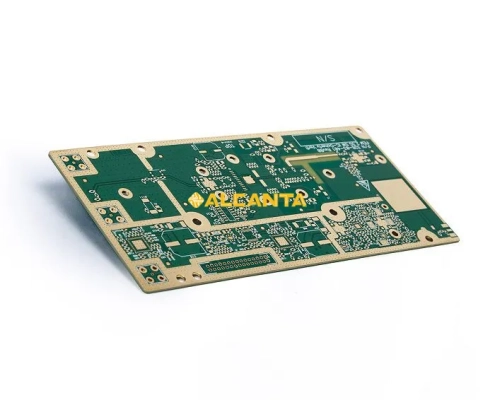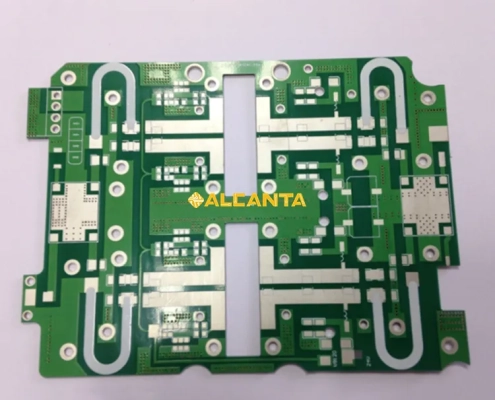Navigating Teflon PCBs: Precision in High-Frequency Circuits
An in-depth look at a specific type of PCB material that stands out for its exceptional properties and applications: Teflon PCBs. PTFE PCBs offer a number of unique advantages, including high temperature resistance, low dielectric loss and excellent high frequency performance. Throughout this discussion, we will explore the unique position of Teflon PCBs in the world of PCB materials and the advantages they provide for a variety of electronic applications.
Overview of Teflon PCBs
Characteristics and Advantages of Teflon PCBs
| Property/Advantage | Description |
| High Temperature Resistance | Teflon PCBs exhibit outstanding resistance to high temperatures, capable of maintaining stability at 260°C or above. |
| Chemical Stability | Teflon PCBs demonstrate excellent chemical stability, resisting corrosion or chemical changes from acids, alkalis, and other chemicals. |
| Excellent High-Frequency Characteristics | Teflon PCBs possess excellent high-frequency characteristics, including low dielectric constant and low dissipation factor, enabling more accurate and stable signal transmission in high-frequency applications. |
| Superior Thermal Stability | Teflon PCBs maintain stability even in high-temperature environments, remaining unaffected by heat-induced performance degradation, suitable for applications requiring prolonged high-temperature operation. |
Comparison with Other Common PCB Materials
| Property/Advantage | Teflon PCB | FR4 PCB |
| Temperature Resistance | High, reaching 260°C or above | Moderate, typically around 130°C |
| Chemical Stability | Excellent, stable against acids, alkalis, and chemicals | Moderate, susceptible to some degree of chemical corrosion |
| Dielectric Loss | Low, typically between 0.001 to 0.002 | Medium, typically between 0.02 to 0.04 |
| Mechanical Strength | Moderate, relatively lower but sufficient mechanical strength | Good, with higher mechanical strength |
Difference between Teflon PCBs and FR4 PCBs
Teflon PCBs and FR4 PCBs represent two distinct categories of printed circuit board materials, each with its own set of characteristics and performance attributes.
Material
- Teflon PCBs: Teflon PCBs are constructed using Teflon-based materials, known for their high temperature resistance, chemical inertness, and low dielectric loss.
- FR4 PCBs: FR4 PCBs are made from a composite material consisting of woven glass fabric impregnated with an epoxy resin, offering good mechanical strength and electrical insulation.
Performance
- Signal Integrity: Teflon PCBs typically exhibit superior signal integrity compared to FR4 PCBs, thanks to their lower dielectric constant and lower dissipation factor. This translates to reduced signal loss and distortion, especially in high-frequency applications.
- Thermal Stability: Teflon PCBs have excellent thermal stability, allowing them to maintain their performance across a wide temperature range. In contrast, FR4 PCBs may experience performance degradation at higher temperatures.
- Chemical Resistance: Teflon PCBs excel in harsh chemical environments due to Teflon’s chemical inertness, whereas FR4 PCBs may be more susceptible to chemical damage.
Cost
- Teflon PCBs tend to be more expensive than FR4 PCBs due to the higher cost of Teflon-based materials and the specialized manufacturing processes involved. However, the higher cost may be justified by the superior performance and reliability offered by Teflon PCBs in certain applications.
Practical Cases
- In high-frequency communication systems, such as 5G networks or satellite communication systems, Teflon PCBs are often preferred over FR4 PCBs due to their superior signal integrity and low loss characteristics. Practical data analysis in such contexts may reveal the significant performance advantages of Teflon PCBs.
- Similarly, in aerospace applications where reliability and durability are paramount, Teflon PCBs are chosen for their resistance to extreme temperatures and harsh environmental conditions, ensuring uninterrupted operation even in challenging settings.
While FR4 PCBs offer cost-effective solutions for many applications, Teflon PCBs provide unparalleled performance and reliability in demanding environments where signal integrity, thermal stability, and chemical resistance are critical factors. By carefully evaluating the specific requirements of each application, engineers can make informed decisions regarding the selection of PCB materials, opting for Teflon PCBs when the performance advantages outweigh the cost considerations.
Application Areas of Teflon PCBs
Teflon PCBs find extensive application across various industries and sectors, owing to their exceptional performance characteristics and reliability.
1. Communication Systems
- Teflon PCBs play a crucial role in high-frequency communication systems, including 5G networks, microwave links, and satellite communication systems.
- Their low dielectric loss and excellent signal integrity make them ideal for ensuring reliable data transmission and reception in these critical communication networks.
2. Radar Systems
- In radar systems, where accuracy and precision are paramount, Teflon PCBs are utilized for their ability to maintain signal integrity even in high-frequency radar applications.
- The superior thermal stability of Teflon PCBs ensures consistent performance across a wide range of operating temperatures, making them well-suited for radar systems deployed in diverse environments.
3. Satellites and Aerospace
- Teflon PCBs are extensively used in satellite communication systems and aerospace applications, where reliability and durability are essential.
- Their resistance to extreme temperatures, thermal cycling, and harsh environmental conditions make them indispensable for space missions and aerospace technologies.
4. High-Frequency Circuits and Microwave Technology
- Teflon PCBs are preferred for high-frequency circuits and microwave technology applications due to their low dielectric constant and low dissipation factor.
- They enable precise signal transmission and reception, making them suitable for microwave amplifiers, RF filters, and other high-frequency components.
5. Automotive Industry
- In automotive electronics, Teflon PCBs are utilized for advanced driver assistance systems (ADAS), radar sensors, and vehicle-to-vehicle communication systems.
- Their high temperature resistance and reliability make them suitable for automotive applications subjected to harsh operating conditions.
6. Medical Devices
- Teflon PCBs are employed in medical devices and equipment where precision and reliability are critical, such as MRI machines, diagnostic imaging systems, and surgical equipment.
- Their chemical stability and biocompatibility ensure safe and consistent performance in medical environments.
Teflon PCBs offer unparalleled advantages in a wide range of industries and applications, including communication, radar, aerospace, automotive, medical, and more. Their unique combination of properties, including high temperature resistance, low dielectric loss, and excellent signal integrity, makes them the preferred choice for demanding electronic systems requiring reliability and performance in challenging environments. As technology continues to advance, Teflon PCBs will continue to play a vital role in enabling innovation and progress across various sectors.
Manufacturer Introduction and Selection Advice
FAQs About Teflon PCB
What is Teflon in PCB?
Teflon, also known as polytetrafluoroethylene (PTFE), is a type of material commonly used in PCBs as a substrate. Teflon offers exceptional properties such as high temperature resistance, chemical inertness, and low dielectric constant, making it ideal for applications requiring reliability and performance in harsh environments.
What is the difference between FR4 and PTFE PCB?
FR4 (Flame Retardant 4) and PTFE (Polytetrafluoroethylene) PCBs are two common types of PCB materials with distinct characteristics. FR4 is a composite material consisting of woven glass fabric impregnated with an epoxy resin, offering good mechanical strength and electrical insulation. PTFE, on the other hand, is known for its high temperature resistance, chemical inertness, and low dielectric loss. The primary differences lie in their material composition, performance attributes, and suitability for different applications.
What material is used for PCB?
Various materials are used for PCBs, with the choice depending on factors such as the application’s requirements, cost considerations, and performance expectations. Common materials include FR4, PTFE (Teflon), polyimide, aluminum, and ceramics. Each material offers unique properties and advantages, catering to different needs in terms of mechanical strength, thermal stability, electrical properties, and cost-effectiveness.
What material is similar to FR4?


